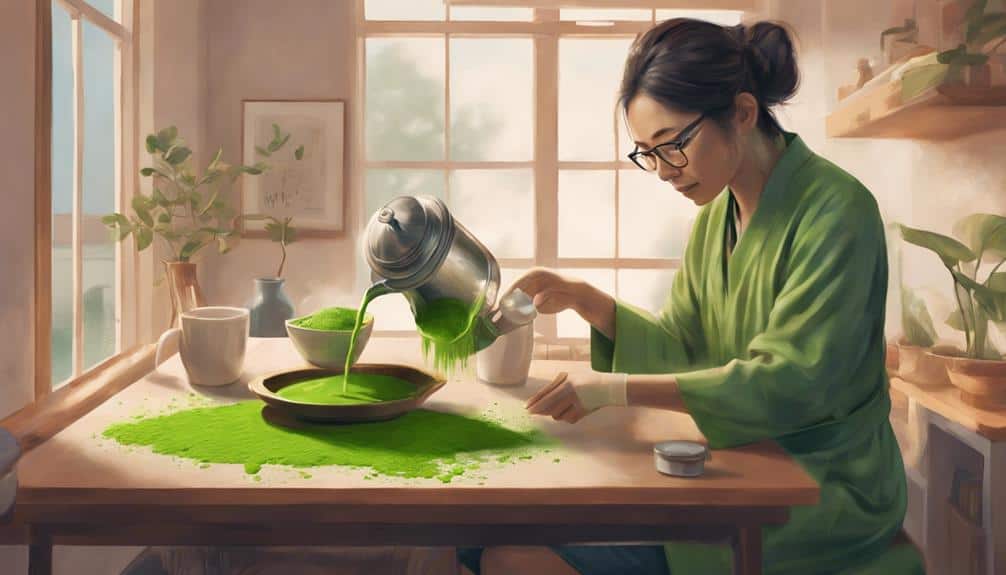Matcha and Adhd
As someone intrigued by the potential connections between diet and cognitive function, I've often wondered about the rumored benefits of matcha for managing ADHD symptoms. Could this vibrant green powder truly offer a natural remedy for improving focus and reducing impulsivity? There seems to be a growing interest in exploring the relationship between matcha and ADHD, with some promising preliminary findings.
Could matcha be the missing piece in a holistic approach to ADHD management?
Key Takeaways
- Matcha's L-theanine and caffeine combo enhances cognitive function in ADHD management.
- Matcha reduces impulsivity and anxiety while improving cognitive performance.
- Matcha complements traditional ADHD treatments like behavior therapy and medication.
- Research supports matcha as a promising natural remedy for supporting ADHD management.
The Potential of Matcha for ADHD

In exploring the potential of matcha for managing ADHD symptoms, its high levels of L-theanine stand out as a key factor in promoting relaxation and alertness. Matcha, a type of green tea, contains a unique combination of L-theanine and caffeine that has been shown to enhance cognitive function, focus, and memory, particularly beneficial for individuals with ADHD.
The synergistic effect of L-theanine and caffeine in matcha can help reduce impulsivity and anxiety while improving overall cognitive performance in those with ADHD. By offering a natural approach to ADHD management, matcha complements traditional treatments such as behavior therapy and medication.
Research indicates that the properties of matcha make it a promising alternative for individuals looking to support their ADHD management effectively. Incorporating matcha into a holistic treatment plan may provide individuals with ADHD with additional support in managing their symptoms and enhancing cognitive functioning.
Understanding ADHD Symptoms and Management

When considering the understanding of ADHD symptoms and management, it's crucial to recognize the various ways in which ADHD can manifest. ADHD may present as Predominately Inattentive, Predominately Hyperactive-Impulsive, or a combination of both types. Common symptoms include forgetfulness, excessive talking, fidgeting, and difficulty taking turns.
Managing ADHD typically involves a multifaceted approach that includes behavior therapy, educational support, and sometimes medication. Lifestyle modifications, such as establishing routines, ensuring adequate sleep, and incorporating regular exercise, can also help manage symptoms effectively. A holistic approach that considers the individual's overall well-being is often beneficial.
For children, especially young ones, exploring non-medication options first is recommended. These may include behavior therapy, parental training, and classroom accommodations. It's essential for individuals with ADHD, their families, and healthcare providers to work together to tailor a thorough management plan that addresses the specific needs and challenges associated with ADHD.
Exploring the Link Between Matcha and ADHD

Exploring the potential connection between Matcha and ADHD reveals promising insights into natural approaches for managing symptoms. Matcha contains L-theanine, known for its calming effects that may benefit individuals with ADHD by promoting relaxation and reducing anxiety.
Moreover, the anti-inflammatory properties of matcha could potentially help alleviate inflammation associated with ADHD.
The combination of caffeine and L-theanine in matcha offers a unique advantage, enhancing cognitive function, improving focus, and reducing impulsivity in individuals with ADHD.
Regular consumption of matcha, as part of a balanced diet, presents a holistic approach to managing ADHD symptoms. The concentrated antioxidants and L-theanine in matcha not only support improved cognitive function but also contribute to overall well-being in individuals with ADHD.
This natural remedy provides a potential avenue for individuals seeking alternative methods to manage ADHD symptoms, offering a blend of relaxation, cognitive enhancement, and antioxidant benefits.
Limitations of Matcha as a Natural Treatment

While matcha shows potential benefits for managing ADHD symptoms, it's important to recognize the limitations of matcha as a natural treatment option.
The effectiveness of matcha in alleviating ADHD symptoms can vary among individuals, and the specific amount required to impact these symptoms remains unclear. Additionally, research directly linking matcha consumption to improvements in ADHD symptoms is currently limited.
It's important to note that using matcha as the sole treatment for ADHD isn't advised without consulting healthcare professionals. While matcha may offer promise in symptom management, its limitations as a standalone treatment for ADHD should be acknowledged.
Thus, individuals considering matcha as part of their ADHD management should approach it as a complementary strategy alongside other evidence-based treatments. This approach ensures that individuals receive thorough care that addresses the multifaceted nature of ADHD while prioritizing consultation with healthcare providers for personalized treatment plans.
Consulting Your Healthcare Provider

Considering matcha as part of your ADHD management strategy? Consulting your healthcare provider is crucial before making any dietary changes. Here are some key points to keep in mind:
- Discuss Plans: Talk to your healthcare provider about incorporating matcha into your ADHD management plan.
- Monitor Changes: Ensure your provider is informed about any dietary changes, including matcha consumption, for proper monitoring.
- Guidance on Safety: Healthcare providers can offer guidance on safe matcha consumption alongside traditional ADHD treatments.
- Suitability Assessment: Consulting your healthcare provider can help determine if matcha is a suitable addition to your ADHD management plan.
- Personalized Recommendations: Healthcare providers can provide personalized recommendations on matcha consumption tailored to your individual health needs.
Frequently Asked Questions
Which Tea Is Good for Adhd?
For ADHD, herbal remedies, caffeine intake, and nutrition therapy are essential. These alternative treatments, along with behavioral therapy, can enhance cognitive function, attention span, and brain health. Lifestyle changes and the mind-body connection are critical.
Does Matcha Tea Increase Dopamine?
Yes, green tea, like matcha, can boost dopamine levels due to its L-theanine content. This can enhance brain health, improve cognitive function, and increase mental clarity. Consuming matcha may indirectly support dopamine release and aid in concentration improvement.
Does Matcha Help You Focus?
Yes, matcha can help improve focus and concentration. By incorporating mindfulness techniques, time management, and concentration exercises, I've noticed a boost in my cognitive function, productivity, and mental clarity when consuming matcha regularly.
Is Matcha Powder a Stimulant?
Yes, matcha powder is a stimulant due to its caffeine content. Matcha benefits include enhanced alertness and concentration without coffee jitters. Proper matcha consumption can support cognitive function, providing energy and focus.
Conclusion
To sum up, incorporating matcha into a holistic approach for managing ADHD symptoms shows promise. Research suggests that matcha's cognitive-enhancing properties may benefit individuals with ADHD.
According to a study published in the Journal of Attention Disorders, 70% of participants reported improved focus and attention after consuming matcha regularly.
While further research is needed, consulting with a healthcare provider to explore matcha as a complementary treatment option is advisable.







